A visually impaired actor and hard-of-hearing activist describe new pandemic challenges, with touching verboten and lip-reading impossible in a sea of masks
By MARISSA NEWMAN
22 May 2020, 6:47 am
The Times of Israel
Last week, Mohammad Shaqqur, 38, handed in his keys to his Jaffa landlord and reluctantly returned to his parents’ home in the Lower Galilee town of Sha’ab. The newly unemployed theater actor, placed on open-ended leave during the pandemic, now mostly stays indoors, feeling “aimless and fearful about the future” and wondering when, and if, he’ll again feel the quickening pulse of the audience beat inside him as he treads the boards.
His is seemingly the typical story of the 1 million jobless Israelis feeling the economic fallout of the coronavirus outbreak. Shaqqur, however, also suffers from congenital blindness and is among the tens of thousands with disabilities coping with a slew of lifestyle changes wrought by the pandemic, in addition to the financial uncertainties.
“I’ve gotten used to living in the city, everything is accessible. Villages are not accessible,” he said of his relocation to his hometown.
His employer, the Na Laga’at cultural organization and its theater troupe of blind and deaf actors, is bleeding millions of shekels since it was forced to close on March 15 due to the virus. Cutbacks are inevitable, if they even manage to reopen at all, according to its director. And Shaqqur is well aware that if he’s laid off, he won’t easily find a new job.
“My fear is that the center will close and I’ll lose my employment,” said Shaqqur, who has worked in various departments of the organization for nearly a decade.
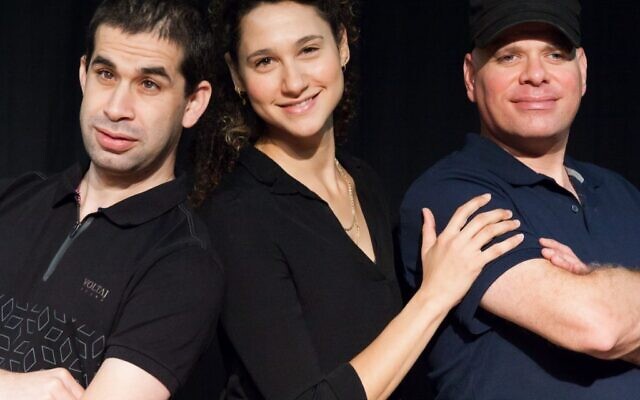
Photo: Mohammed Shaqqur (L) with other actors (Courtesy)
When Mili Wasserstrom now leaves her home, she is met by a sea of masks. When spoken to, the director of the Ma’agalei Shema organization, which aids the deaf and hearing-impaired, said she nods good-naturedly, though she often has no idea what she is agreeing to.
“In every direct communication with a person, I am aided by lip reading,” said Wasserstrom, who is hard of hearing from birth. “So if now, the mask slightly muffles their voice and I also can’t read their lips, I personally can miss between 10%-20% and 40% of what is being said to me. I have to function like this at my workplace, at the doctor with my child, at my child’s kindergarten, at the grocery store, the supermarket.”
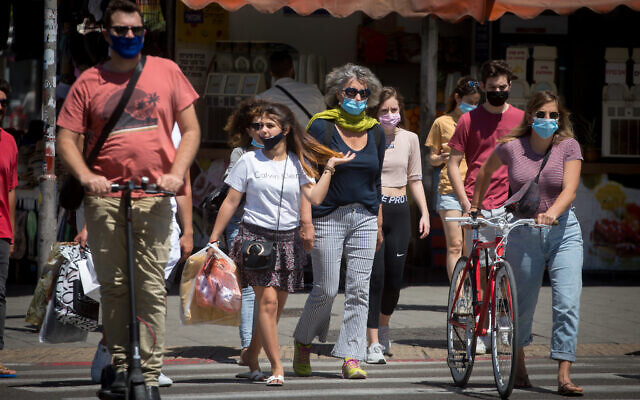
Photo: People wear protective face masks in Tel Aviv, on May 08, 2020.(Miriam Alster/FLASH90)
Though Israel has largely relaxed its coronavirus restrictions as the number of cases diminished, the country has kept in place an order on mask-wearing and social distancing that will likely remain in force for the foreseeable future to stem the spread of the highly contagious pathogen. (The order was temporarily lifted until the end of this week amid dangerously scorching weather).
For the visually impaired in Israel who rely on touch to read and engage with their surroundings, or the hearing-impaired who depend on proximity and a clear view of a speaker’s lips, the coronavirus has presented a host of new stumbling blocks. Even as they attempt to adapt, the organizations supporting them are struggling to stay afloat in the maelstrom, with government funding and their own profits drying up.
According to the Welfare Ministry, as of 2013 (the latest figures on its site), there are 23,000 legally blind people in Israel. One-third of blind men live alone, as well as nearly 60% of women, it said. The ministry said there are 15,000 Israelis with serious hearing impairments, and 1 in 3 of those over 65 years old will develop some impairment.
Set back by a century
In the early days of the pandemic, Wasserstrom, like most Israelis, would sit down with her family in the evening to watch Prime Minister Benjamin Netanyahu’s near-nightly press briefings on the pandemic outlining the government’s rapidly shifting and increasingly unsettling lockdown directives.
But there were no subtitles or simultaneous translations into sign language on the initial broadcasts, she said.
 Wasserstrom — who spoke to The Times of Israel by phone enhanced with technology that allows her to hear, and who emphasized that she has high function — relied on her husband and children to fill her in. The feeling that she could not fully access information or may be misunderstanding the dangers and rules heightened her terrors surrounding the virus.
Wasserstrom — who spoke to The Times of Israel by phone enhanced with technology that allows her to hear, and who emphasized that she has high function — relied on her husband and children to fill her in. The feeling that she could not fully access information or may be misunderstanding the dangers and rules heightened her terrors surrounding the virus.
Photo: Prime Minister Benjamin Netanyahu, left, with Health Minister Yaakov Litzman, right, and Health Ministry General Manager Moshe Bar Siman-Tov at a press conference about the coronavirus at the Prime Minister’s Office in Jerusalem, March 11, 2020. (Flash90)
At the same time, the Health Ministry and Education Ministry flooded its social media channels with video clips on the rapidly changing rules, but without subtitles or sign language translations, she said. (Wasserstrom said she had been in touch with the Health Ministry, which worked hard to make the content accessible though it could not keep up with the pace and did not transcribe everything).
 “If there was a certain measure of panic and uncertainty in the broader population, this was amplified among the community that we represent,” she said, noting that with partial information “you fill it in with guesses on whatever you missed and it only creates more tension and stress that is entirely unnecessary.”
“If there was a certain measure of panic and uncertainty in the broader population, this was amplified among the community that we represent,” she said, noting that with partial information “you fill it in with guesses on whatever you missed and it only creates more tension and stress that is entirely unnecessary.”
Photo: Mili Wasserstrom, head of the Ma’agalei Shema organization (Courtesy)
Just recently, as her son was set to return to kindergarten, the teacher sent out a Health Ministry video for all the parents to watch on the new regulations. She opened the link — and closed it immediately. There were no subtitles and she couldn’t follow the lip reading.
“If there’s something we’ve learned during this period, it’s that these things are very much pushed aside in times of emergency. And in times of emergency, the information needs to be very accessible for everyone.”
She said the approach set back the fight for deaf rights back to “the twenties” — the 1920s.
Her organization aiding deaf and hard-of-hearing children and youth is also struggling financially due to Welfare Ministry budget cuts, and has begun raising money, since, Wasserstrom said, “We don’t know what the world of philanthropy will look like on the day after the coronavirus.”
“Right now, we feel, within the community, that we really have been set back with everything that has to do with accessibility because suddenly something like going to a medical clinic, where the doctor is wearing a mask and it’s difficult to communicate with him, is a problem.”
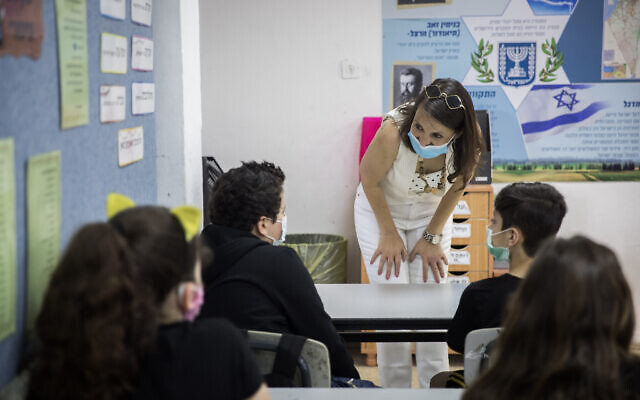
Photo: Israeli students and teachers wear protective face masks as they return to school, at Hashalom School in Mevaseret Zion, near Jerusalem, May 17, 2020. (Yonatan Sindel/Flash90)
Educators and activists struggle to adapt
The adjustment for teachers and activists aiding the visually and hearing-impaired has been riddled with new challenges.
For hard-of-hearing children, videoconferencing technology hasn’t much helped, as students in remote learning can’t follow lip reading on the screen in a chaotic framework, when it’s unclear who is speaking, Wasserstrom said.
Moreover, some hard-of-hearing children in regular schools have gone back to class only to discover their teacher was wearing a mask, she said.
“Today, in the classroom, there is no obligation to wear masks. But some teachers, for their own safety — and I can’t argue with them — do wear masks, and it makes it difficult for the [hearing-impaired] children to understand.”
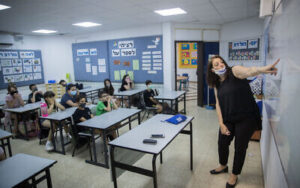 Educators in schools for the blind have similarly said teleconferencing during lockdown was not feasible for many visually impaired.
Educators in schools for the blind have similarly said teleconferencing during lockdown was not feasible for many visually impaired.
Photo: Israeli students and teachers wear protective face masks as they return to school, at Hashalom School in Mevaseret Zion, near Jerusalem, May 17, 2020 (Yonatan Sindel/Flash90)
Rachel Skrovish, who runs The Jewish Institute for the Blind in Jerusalem, which runs programming for both children and adults, said the school was adhering to Health Ministry directives and being careful.
Staff and students wear masks, but “you can’t keep a distance of two meters, it’s not possible, because all of our work is through touch.”
While some children confided that they were relieved to be allowed to stay home during the lockdown, she said, for others the virus exposed their social isolation and loneliness.
“It brings to the surface all of the difficulties, of what it means to be alone, what it means to be without family, what it means to be without your friends. It brings to the surfaces difficulties that may be present throughout the year and sharpens them,” she said.
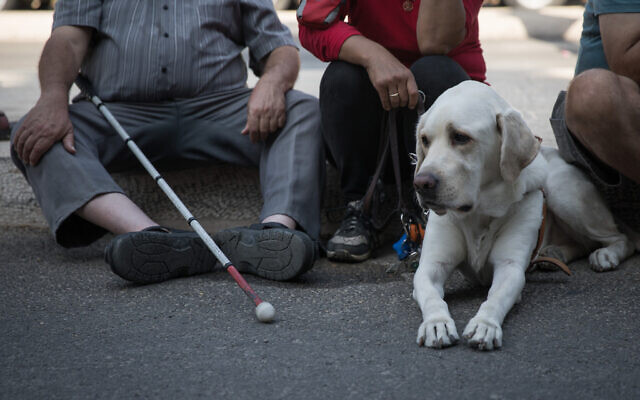
Photo: Illustrative photo of a blind man in Jerusalem. October 23, 2017. (Hadas Parush/Flash90)
Skrovish and Wasserstrom also provided guidance on how bystanders should relate to those who may need help, balancing health concerns with altruism in the age of the coronavirus.
A blind person should, in principle, be able to navigate without help and will ask for assistance if needed, said Skrovish. But if they appear lost or in need, and both the blind person and the person seeking to help are wearing masks, they should not be ignored, she stressed.
“You don’t have to touch the blind person, either. If there is a concern about contact or touch, you can say, ‘continue straight,’ or ‘follow me and you’ll hear my voice and walk with me, there are obstacles here.’ If you offer your elbow, I think you can also keep a fair distance” or place their hand on your shoulder, she said.
Said Wasserstrom: “If a deaf person or hard of hearing person is in front of you, it may be better to remain two meters’ apart but remove your mask.”
Her organization is also advocating the widespread use of transparent masks.
Will the show go on?
Before the pandemic, Shaqqur said his daily routine was “full of activity.”
Since 2011, he has worked for the Jaffa-based Na Laga’at, which runs a theater of blind and deaf actors as well as those with other disabilities, billed as the only of its kind worldwide, as well as the “Blackout” restaurant in the dark serviced by blind waiters, and various workshops.
He began as a waiter and quickly learned it was not for him, and has also worked in the theater’s marketing and accessibility coordination departments but found his real calling on the stage.
“It was always fun to feel the crowd,” he said.
According to its director Oren Itzhaki, the facility has hosted 1 million visitors since it opened in 2004. It employs 120 workers, 70% of them with disabilities.
He estimated that due to the pandemic, which has forced it to close fully since March 15, some 40% of its annual activities have been canceled and millions of shekels lost. The organization hopes to resume its activities in a limited format in July and August, though he stressed that it would not be able to do so without government assistance to cover some of its losses for the previously profitable venture, in addition to layoffs. Though the workers receive disability benefits from the state, they would take a significant financial hit due to the reduced number of shows and activities.
“On a personal level, it’s very difficult to look my workers in the eyes and tell them, ‘we’re going back to normal, it will be okay,’” he said. “I assume that not all of them will return.”
Shaqqur is nevertheless hopeful the troupe’s fans won’t let them go under.
“I very much believe in the audience, that they will support us as they supported us before,” he said. He also expressed hope the Israeli government would recognize their plight.
Israel’s decision makers, he remarked, ought to “open their eyes and see the situation.”
Source: www.timesofisrael.com/as-virus-wanes-israels-blind-and-deaf-step-out-into-a-more-hostile-world/





